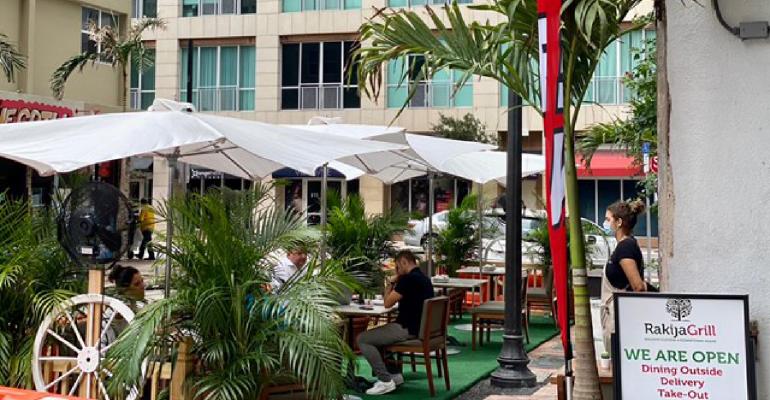Cities are dealing with new coronavirus restaurant restrictions in various ways, but Miami has provided expedited service for operators trying to deal with renewed bans on indoor dining.
Last week, in response to a spike in COVID-19 infection, Miami-Dade County Mayor Carlos Gimenez issued a new order that limited which restaurants to outdoor seating only.
In response, Downtown Miami worked to transforming city sidewalks and parking spaces into outdoor dining areas.
Marija Banjac, owner of the Balkan-Serbian Rakija Grill on Third Avenue, was one of the first restaurants to take advantage of Miami’s expediting process.
“It’s better something than nothing, and the street looks amazing,” Banjac said of the pedestrian-friendly sidewalk-café feel it has created on Third Avenue. “It’s helping in this difficult economic situation.”
Here 73-seat restaurant is now limited to four four-tops on new areas streetside.
“At the moment, we are unable to use the inside area,” Banjac said during an interview from her home on Monday. “Outside, we have set up four tables … we are able to use four tables for four guests, so we can seat 16 guests.”
The Miami Downtown Development Authority, which oversees economic development in the urban core, partnered with the City of Miami and the Miami Parking Authority in a pilot program to curate the sidewalk café permit process in support of the city’s restaurants.
Through this program, the Miami DDA assists restaurateurs with the permitting and required protection needed to use the public-right-of-way and is funding the umbrellas, tables and chairs many restaurants require in order to pivot to outdoor dining.
Banjac’s Balkan and Serbian restaurant, which offers such best-sellers as grilled ćevapi with pita bread and stuffed cabbage, has found the outdoor setup to be beneficial for its breakfast, lunch and dinner served.
“This is an amazing outside seating area,” Banjac said.
Changing rules on capacity and opening hours with curfews has been challenging, she said, but the cross-department help from the city has been helpful in coordinating applications for variances and city approvals.
Miami’s summer heat is another challenge, Banjac said, and that is compounded by a 10 p.m. curfew in the city. Those are among many shifting regulations on restaurant operations as the city wrestles with stemming the spread of the coronavirus.
“It’s a struggle, but that’s life,” she said with resignation.
The outdoor dining area has helped, she added. “It’s better something than nothing, and the street look amazing,” Banjac said of the pedestrian feel. “It’s helping in this difficult economic situation.”
Other participating restaurants in the Miami program include the gourmet Italian food hall Casa Tua, the Italian restaurant Soyo y Pomodoro, chef Danny Serfer’s classic sub shop Vinaigrette, French bistro Café Bastille, Mediterranean-Lebanese Fusion eatery Meet the Goat, Mexican Seafood house Pez Miami, Peruvian restaurant Pollos & Jarras, casual Latin locale Las Palmas Cafeteria, local pizzeria Favas Pizza and Asian fusion buffet San Villa Asian Fusion.
Downtown Miami serves as home to 3,335 businesses, including 358 restaurants that serve a residential population of 100,000 people, a daytime population of 250,000, and more than six million visitors a year.
“Restaurants are the lifeblood of Downtown Miami’s appeal as one of the world’s most desirable places to live, work and visit,” said Christina Crespi, executive director of the Miami Downtown Development Authority, in a statement.
With the launch of the Miami DDA’s new outdoor=dining initiative, restaurants are able to reclaim the public right-of-way to expand their outdoor operations and safely serve our community,” Crespi said.
The agency also launched a micro-grant program, now completed, that offered businesses up to $1,250 in reimbursements for expenses incurred associated with a safe reopening and created the “Go Local, Go Direct” campaign to drive business to neighborhood eateries.
More information is available at MiamiDDA.com.
Contact Ron Ruggless at [email protected]
Follow him on Twitter: @RonRuggless





